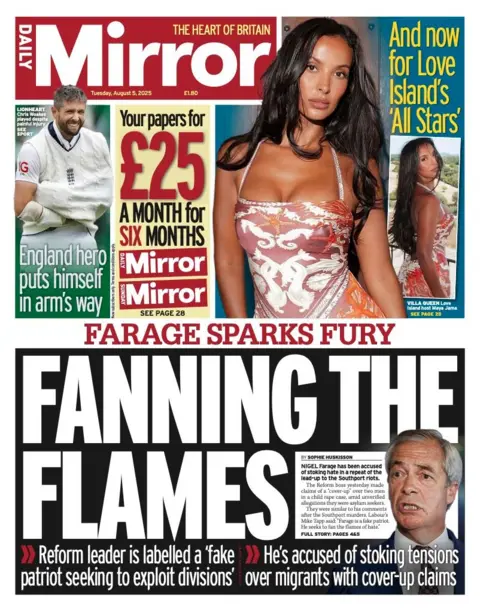The current political landscape in the UK has found itself ignited by various controversies and debates surrounding pivotal issues, sparking a range of reactions from notable political figures and the media. At the forefront are discussions initiated by Nigel Farage, the leader of Reform UK, who has made headlines for his comments regarding the release of immigration statuses for suspects charged with serious crimes. This comes in the wake of the recent arrest of two individuals in connection with the alleged rape of a 12-year-old girl in Warwickshire, stirring public outcry and media scrutiny.
The Daily Mirror has characterized Farage’s rhetoric as “fanning the flames,” insinuating that his calls for greater transparency from the police regarding the suspects’ immigration status could exacerbate racial and social tensions within the community. His statements reflect a complex intersection of immigration policy, public safety, and societal attitudes towards crime and nationality, which many view as incendiary at this sensitive time. Political opponents, particularly from the left, are likely to argue that such comments deepen divisions and distract from addressing the root causes of crime.
Amidst this backdrop of political turmoil, the public has also been glued to the ongoing cricket matches featuring the English cricket team. In a poignant portrayal, Chris Woakes has been highlighted anew, referred to as England’s “one-armed warrior.” Woakes was seen participating in a test match while nursing an injury that has rendered his arm in a sling. This imagery serves as a metaphorical reflection on the broader resilience and struggles of the nation, particularly as the cricket team faces challenges both on and off the field.
As media narratives unfold, national discussions have been shaped not only by sports but also by broader concerns such as women’s safety. The Daily Express has highlighted the remarks of Reform MP Lee Anderson, who expressed that the British state is “failing to protect” women and girls. This comment draws attention to the cultural and societal responsibilities tied to crime prevention and the protection of vulnerable populations. The mounting concerns about safety, echoed in various papers, amplify the dialogue surrounding legislation, policing strategies, and public health crises arising from social issues.
In terms of educational policies, the Telegraph has reported on legislative moves that affect the private school sector. Specifically, parents have reportedly intervened en masse, paying over £500 million in advance fees to avoid financial implications from a 20% VAT raid introduced in January. This narrative navigates themes of economic inequality and parental responsibility, suggesting a proactive if not desperate response to financial pressures unleashed by state policies.
Further complicating the landscape is the i Paper’s announcement of imminent operational changes in immigration policy, emphasizing that the Home Office plans to detain small boat migrants for deportation to France. This controversial move is expected to spark significant debates surrounding human rights, immigration ethics, and national security.
At the same time, the media addresses other sensational stories, including high-profile criminal charges against personalities significant in public life. For instance, Repair Shop star Jay Blades faces two counts of rape, which attracts considerable media scrutiny and represents issues of accountability and public perception intertwined with fame.
In summary, the British media landscape currently reflects a society grappling with pressing issues of safety, immigration, and accountability, highlighted by public figures who navigate both social commentary and political agendas. The interplay between alarming headlines and community sentiment signifies a period of intense scrutiny as citizens engage in the broader discourse of national identity, safety, and responsibility.












